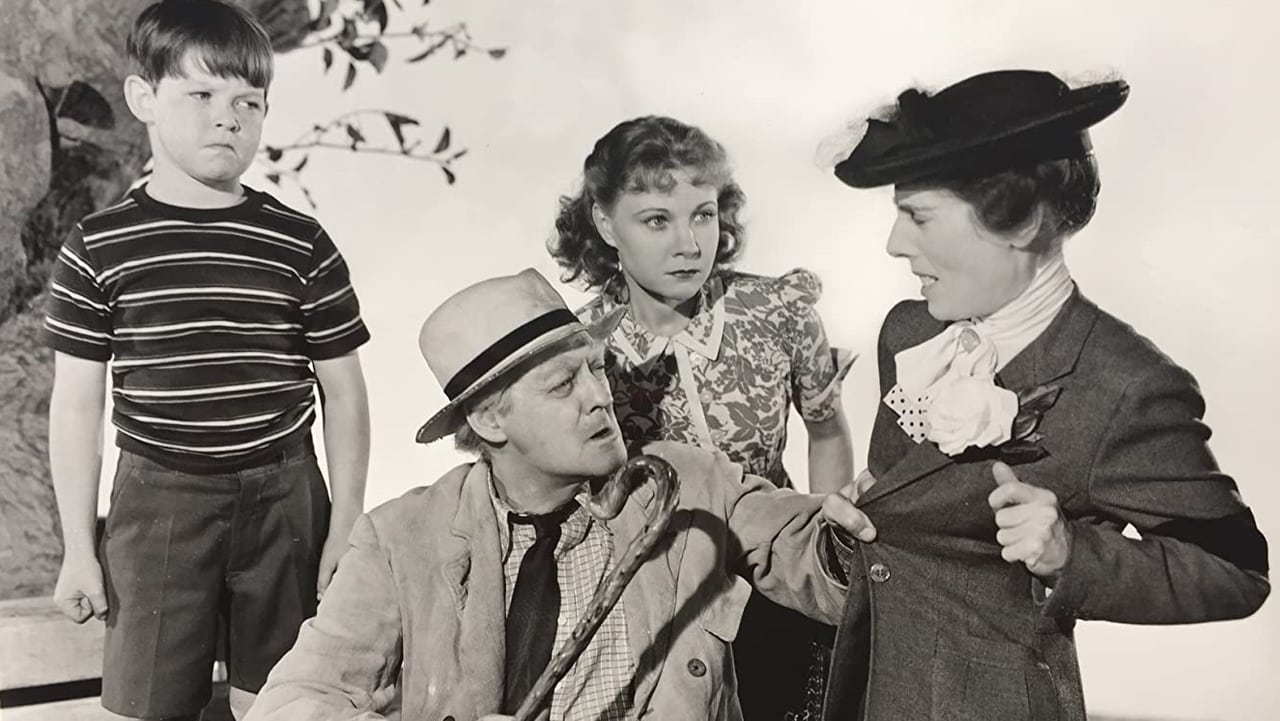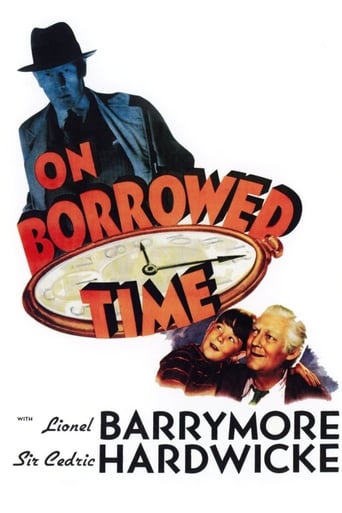mark.waltz
This is definitely a classic play ready for reviving. Even with James Earl Jones being readied for his next Broadway play at this writing ("The Gin Game"), I could see him playing the gruff but lovable grandfather, wheel-chair bound but far from ready to throw the towel in. As in the recent revival of "You Can't Take It With You" with Jones, this is another perfect role for him that Lionel Barrymore had played on screen. Bobs Watson is the grandson, orphaned very suddenly, and between Barrymore and his ailing wife Beulah Bondi, taking care of him is a chore that they don't mind but don't always have the energy for. Watson adores his grandfather, but the constant interference by a maiden aunt from the other side of the family (maliciously played to perfection by Eily Malyon) has his happiness with his grandfather being threatened. Malyon learns that Watson has inherited a somewhat large bequest and decides to do whatever she takes to adopt him legally, even if this means having the grandfather declared mentally incompetent.Then, there's a mysterious stranger, played by Sir Cedric Hardwicke, who has come to escort Bondi off to eternity (in one of the early scenes that is touchingly done), returning for Barrymore, and his being trapped up in a gorgeous apple tree thanks to a curse Barrymore put on it. Hardwicke's presence invokes both fear and peace, and when he finds he can't escape the tree (or the curse), his violence erupts to the point of a massive tremor that tosses the apples around more furiously than the talking trees in "The Wizard of Oz" (also made by MGM in 1939). But without his freedom, there's tragic consequences for the ailing who can't be taken away from their suffering. Two locales come to aide Maylon in her efforts to take Watson from Barrymore, but the old man is determined to keep this nasty biddy from getting her hands on him. Henry Travers, a local doctor, catches on to the secret of the tree, and with the help of the housekeeper (a very subtle and lovely Una Merkel), makes an effort to prevent Malyon from achieving her greedy goals. When Hardwicke is left alone with Watson, he gently discovers a way to get out of his wooden cage which leads to a finale that unless you are either as unsympathetic as Malyon or as cackling as the wicked witch of the west, you won't be able to avoid floods of tears which is exactly what happened to me upon my third viewing of this delightful fantasy.Mostly cast in bits, this is perhaps Malyon's largest movie role, and she relishes the opportunity to chew the scenery, being as pickled and meddlesome as Margaret Hamilton's Miss Gulch in "The Wizard of Oz". I give her a nomination as one of the best villainesses in films in 1939 along with Hamilton, Kay Francis in "In Name Only" and Flora Robson in "We Are Not Alone", to mention the few that come to my mind. Bondi will steal your heart as the very loving grandmother, as aged as she was in the 1937 tearjerker "Make Way For Tomorrow", and every bit as profound. Watson is never manipulatively cloying as he was in "Boy's Town", so I have to call this his best performance. Barrymore plays a variation on all the other old grumps he'd been playing, but is still effective. If you had a relationship with your grandfather like they do here (and like I did years ago with my own grandfather), you will truly feel the camaraderie between the two, best friends and true soul mates. Grant Mitchell shows up briefly as the attorney manipulated by Malyon, and Nat Pendleton and James Burke also offer memorable performances as well. So pull out those hankies, grab a few apples, and sit back, 'cause once you experience this lovely heart-breaker, you will never, ever forget it.
Michael_Elliott
On Borrowed Time (1939) *** (out of 4)This MGM film comes only second to their FREAKS as being the strangest movie Hollywood would deliver in the 1930's. I had heard a lot about this thing but nothing you read can quite prepare you for what you actually see. This fantasy tells the story of a loving grandfather (Lionel Barrymore) who wants to keep his grandson (Bobs Watson) away from his aunt (Eily Malyon) who simply wants his inheritance money from his parent's deaths. After the death of the grandmother, Death himself, calling himself Mr. Bink (Cedric Hardwicke) shows up t take grandpa but he has a trick up his sleeve. He asks Death to climb the apple tree out back where the old man is able to trap Death there so that no one can ever die again. I love searching out and viewing rather strange movies and this here has to come close to being one of the strangest fantasy films ever made. There's certainly a touching side to this film but there's also a rather dark side. The strange thing is that this isn't really a comedy or a drama and the film never goes for that type of emotions. Instead the film seems to pride itself on just being bizarre and unlike anything most people had seen. I consider myself an expert at the bizarre yet my jaw was flying open several times through this thing. There's so much great stuff but at the same time everything comes off rather campy just because of the story you're watching. Barrymore is pitch perfect as the cranky but lovable old man who only wants to see his grandson grow up happy. We have Hardwicke doing a very good job in his role as Death. Beulah Bondi, Nat Pendleton and Henry Travers all add nice supporting performance to their minor characters. Even the underused Una Merkel comes off very touching as the devoted maid. Watson, who some might remember as Pee Wee in BOYS TOWN, is a whole 'nother story. I'm really not sure what to think because on one hand he's terrific but on another level he gives one of the worst performances I've seen from a child actor. What he's great at is acting the "loud mouth" when he tries to come off like Barrymore. The two have a nice bond in their scenes together and this is especially true when they're battling the evil aunt. What doesn't work so well are his emotional or crying scenes. It seems the director simply wanted him to scream at the top of his lungs since he was obviously not able to produce any real tears. This becomes quite annoying and happens throughout the film. Then we have the ending, which is fairly touching but I'm sure no one is going to expect it coming. I wouldn't add this title to the masterpieces of 1939 but there's something very unique and original about it that makes it a must see.
whiteh5
When I first saw the film in 1981, I felt that I had just watched a classic. Enough has been written here to describe the plot line so I skip ahead to some of the reasons why this film was overlooked when it was released and why it continues to be overlooked today. First of all, it came out in 1939 which is probably the greatest year in Hollywood history. Such huge color releases like Wizard of OZ and Gone With The Wind made some smaller black and white films less appealing. The USA was still fighting the economic hangover from the great depression and the movie going public was spending it's money on more upbeat fare like Gunga Din and not on a movie that deals with death as it's main theme. And this leads to why, for me, the movie was really overlooked. It dealt with death and perhaps the world's political and economic condition doomed this movie to it's relative obscurity.
bornyesterdayandtomorrow
When I first watched this movie, I was expecting Lionel to be a mean old man, but he wasn't. He was a nice old man who loved his wife, his grandson, and hated Death.I loved Death, though. Not to be mean, but he was so clever! I also loved how they captured him in the tree and wouldn't let him down. Anyone who touched the tree would die. Other than that, death just didn't exist. Brilliant. Of course, they had to let him down--eventually.THE ENDING:Death kills all of them (their time has come--that sort of thing--nothing vile). They go walking off. The movie goes off. MY REACTION:I'm crying. I didn't know that this movie was made in 1939! A great film. A must see!

